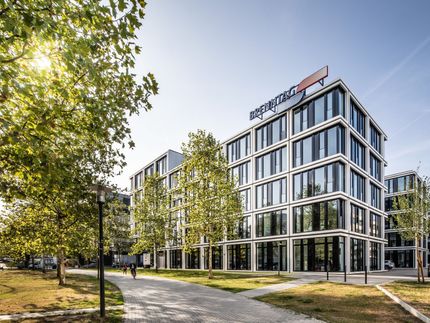Merck Remains on Course in a Challenging Environment
Healthcare and Performance Materials more strongly affected by the Covid-19 pandemic than Life Science
Advertisement
Merck registered the effects of the Covid-19 pandemic in all business sectors in the second quarter. Healthcare and Performance Materials were affected most strongly. In comparison with the year-earlier quarter, Group sales increased by 3.7% to € 4.1 billion. EBITDA pre, the Group’s most important earnings indicator, fell by -5.7% to € 1.1 billion in the second quarter. Irrespective of this, the company specified its sales forecast for fiscal 2020 and now expects Group sales of between € 16.9 billion and € 17.7 billion. In addition, Merck has raised the lower end of the range for expected EBITDA pre and now forecasts a value between € 4.45 billion and € 4.85 billion. Merck also specified its forecast for earnings per share pre, which it now expects in a corridor between € 5.60 and € 6.25.

Symbolic image
Photo by Atte Grönlund on Unsplash
“Despite considerable pandemic-related obstacles in some businesses, overall we did well in the second quarter. In recent months, we again proved the strengths of our diversified business model with three strong, innovation-driven business sectors,” explained Stefan Oschmann, Chairman of the Executive Board and CEO of Merck. “Especially in view of the pandemic, it is apparent that our strategic focus on science and technology is the right one. We are developing tomorrow’s therapies, paving new avenues for scientists and driving the digital transformation. All of this is more important today than ever before.”
Merck is supporting the fight against the Covid-19 pandemic in multiple ways
As a science and technology company, Merck also helped to meet the global challenges posed by Covid-19 in many different ways in the second quarter. The company is collaborating with more than 45 vaccine developers worldwide, including Baylor College of Medicine in Houston, Texas, among others. In June, the company announced that the U.S. Food and Drug Administration (FDA) approved the investigational new drug application (IND) for the investigational compound M5049 for the treatment of patients with Covid-19 pneumonia. In this context, a Phase II randomized, controlled clinical study evaluating the safety and efficacy of M5049 in this patient population was started at the end of July. In addition, the company donated larger amounts of disinfectant and two million FFP2 protective face masks. “In the battle against Covid-19, we will continue to closely support our customers and partners in the science space. Collaboration across borders and sectors is key in effectively fighting the pandemic,” said Oschmann.
Merck Group posts acquisition-related growth in the second quarter
The 3.7% year-on-year increase in Group sales in the second quarter primarily reflects acquisition-related growth in the Performance Materials business sector and organic growth in Life Science. Group-wide, net sales decreased organically by -2.5%, mainly due to the impacts of the Covid-19 pandemic. Negative foreign exchange effects lowered Group sales by -0.9%. Group sales rose by 7.1% due to portfolio changes. EBITDA pre declined by -5.7% to € 1.1 billion in the second quarter. The organic decline amounted to -11.5%, among other things attributable to income from milestone payments in Healthcare in the year-earlier quarter. The impact of negative foreign exchange effects on EBITDA pre was -3.1%. By contrast, acquisitions were responsible for an increase of 8.8%. The operating result EBIT declined by -20.6% to € 491 million. Net income fell by -38.5% to € 290 million. At € 1.30, earnings per share pre were -15.6% lower than in the year-earlier quarter. Net financial debt amounted to € 12.6 billion on June 30, 2020. Rapidly reducing debt remains a high priority for the company.
Merck generated growth in all business sectors in the first half of 2020
In the first six months of 2020, net sales of Merck soared by 10.0% to € 8.5 billion. All business sectors contributed to this. Organically, Group sales rose by 2.4%, foreign exchange effects softened the increase by -0.2%, and portfolio effects from acquisitions supported sales by 7.7%. EBITDA pre grew by 9.1% to € 2.3 billion, earnings per share pre rose by 4.9% to € 2.80.
Healthcare: Covid-19 adversely affects the Fertility business
Healthcare sales declined by -10.6% to € 1.5 billion in the second quarter. Organically, the decrease amounted to -7.4% in comparison with the year-earlier quarter. Additionally, there were negative foreign exchange effects of -2.3% and a portfolio effect of -0.9% from the divestment of the Allergopharma business. As expected, the Fertility business was hit hardest by the Covid-19 pandemic since many practices and clinics closed temporarily or reduced their treatment activities. The corresponding sales fell organically by -38.9%. Sales of the Neurology & Immunology franchise declined organically by -5.1%. The medicine Rebif, which is used to treat relapsing forms of multiple sclerosis, saw an organic decline of -12.7%. By contrast, sales of Mavenclad, for the oral short-course treatment of highly active relapsing multiple sclerosis, grew organically by 35.8%. The prescription rates for this treatment declined as expected in a market environment adversely impacted by the Covid-19 pandemic. However, signs of a recovery already emerged in June. Net sales of the Oncology franchise rose organically by 6.3%, driven mainly by the immuno-oncology medicine Bavencio. Sales of the General Medicine & Endocrinology franchise rose organically by 3.9%. At € 374 million, EBITDA pre of Healthcare decreased by -29.1%, particularly owing to income from milestone payments in the year-earlier quarter.
Life Science: Process Solutions remains the driver of growth
Life Science sales rose by 5.9% to € 1.8 billion in the second quarter. Organically, sales increased by 6.3%; foreign exchange had a slightly negative impact of -0.4%. The Process Solutions business unit, which markets products and services for the entire pharmaceutical production value chain, was the key growth driver. Its sales grew organically by 19.8%, first and foremost due to continued high demand in the underlying business, but also as a result of increased orders in the course of the Covid-19 pandemic. By contrast, Research Solutions saw an organic sales decline of -7.1%, mainly caused by the temporary closure of academic laboratories in connection with the pandemic. Applied Solutions recorded flat organic sales growth in the second quarter, also owing to pandemic-related access restrictions of numerous customer laboratories. However, in June both Research Solutions and Applied Solutions showed signs of a business recovery. In the second quarter, EBITDA pre of Life Science rose by 6.7% over the year-earlier quarter to € 569 million.
Performance Materials: Semiconductor business grows further
Performance Materials generated a 38.1% increase in sales to € 814 million in the second quarter. The key factor behind this growth was the net sales contribution of 50.1% from the acquisitions of Versum Materials and Intermolecular. Organically, sales declined by -13.7%. Foreign exchange effects had a positive effect of 1.8% on net sales. Apart from the continued price pressure in the Liquid Crystals business and the strong comparative basis of the previous year, weaker end-user demand triggered by the pandemic led to an organic sales decline of -20.8% in Display Solutions. Net sales of Surface Solutions dropped organically by -29.6%, mainly as a result of declining demand from the automotive and cosmetic markets in the course of the Covid-19 pandemic. By contrast, sales of Semiconductor Solutions grew organically by 12.1%, meaning excluding the effects from the acquisitions of Versum Materials and Intermolecular. A favorable change in market conditions versus the challenging environment of 2019 was a key factor as was the strong performance of the business. Both the business performance of the legacy Versum business and the integration are on track. EBITDA pre amounted to € 238 million, improving by 25.2% over the year-earlier quarter.
Forecast: Slight to moderate organic growth of sales and EBITDA pre in 2020
Merck confirms the assumptions made in the context of the global outbreak of the Covid-19 pandemic as published in the Outlook as of March 31, 2020. The company continues to assume that its businesses will be impacted to varying degrees. Merck expects adverse effects particularly in Healthcare and Performance Materials, whereas no negative effects are anticipated in Life Science. Due to the high level of uncertainty with respect to the further development of the Covid-19 pandemic, this outlook is being made with a considerably higher degree of uncertainty.
Merck presumes varying dynamics with respect to the outbreak in the different regions of the world. For China, Merck assumes that the Covid-19 pandemic reached its peak at the end of the first quarter and that the economic recovery began in the second quarter. For Europe and the United States, the company expects an economic recovery in the second half of the year, even if the situation following the initial outbreak of the pandemic has not yet normalized throughout these regions by the beginning of the third quarter. Moreover, the latest forecast assumes that there will be no widespread lockdowns owing to further disease waves in any of the named regions leading to considerably negative consequences for the economic recovery.
For the full year 2020, Merck expects slight to moderate organic net sales growth compared with the previous year. The company continues to expect that Life Science will be a major driver of this organic growth. Against the backdrop of the Covid-19 pandemic, Merck forecasts that the Healthcare business sector will see a slight organic increase in net sales, whereas the Performance Materials business will see a moderate to strong organic decline in net sales in 2020. In the first three quarters, the effect of the acquisition of Versum Materials will be reported as a portfolio effect, which the company still forecasts in the mid single-digit percentage range at Group level. In addition, Merck expects a foreign exchange effect of -2% to 0%. Overall, the company forecasts Group net sales of € 16.9 billion to € 17.7 billion in 2020.
For 2020, Group EBITDA pre is expected to be in a range of between € 4.45 billion and € 4.85 billion. Contrary to the expectations in the first quarter, Merck now expects slight to moderate organic growth. For the full year, the company expects strong organic growth in Life Science and a stable development in Healthcare, whereas it forecasts an organic decline in the low teens percentage range in Performance Materials. The portfolio effect from the acquisition of Versum Materials is still expected to be in the mid single-digit percentage range and should have a slightly positive effect on the margin of the Group. The expected foreign exchange development is forecast to have a negative effect of between -4% and -2% on Group EBITDA pre; it will be seen particularly in the Healthcare and Life Science businesses. The company forecasts earnings per share pre in a range between € 5.60 and € 6.25.























































